The Fascinating World of Sciences
Science is a vast and diverse field that encompasses the study of the natural world and its phenomena. From the depths of outer space to the intricacies of the human body, science allows us to explore, understand, and marvel at the wonders of our universe.
The Branches of Science
There are several major branches of science, each focusing on different aspects of our world:
- Physical Sciences: This branch includes disciplines such as physics, chemistry, and astronomy, which study non-living matter and energy.
- Life Sciences: Biology, botany, zoology, and ecology fall under this category, focusing on living organisms and their interactions with each other and their environment.
- Earth Sciences: Geology, meteorology, oceanography, and environmental science are part of this branch that studies the Earth’s processes and systems.
- Social Sciences: Anthropology, psychology, sociology, economics, and political science delve into human behavior and societal structures.
The Role of Science in Society
Science plays a crucial role in shaping our society and advancing human knowledge. It drives innovation in technology, medicine, agriculture, and countless other fields. Through scientific research and discovery, we have been able to improve our quality of life, solve complex problems, and push the boundaries of what is possible.
The Scientific Method
At the core of all scientific inquiry is the scientific method. This systematic approach involves making observations, forming hypotheses, conducting experiments or investigations to test those hypotheses, analyzing data, and drawing conclusions based on evidence. The scientific method ensures that findings are reliable, reproducible, and subject to scrutiny by peers in the scientific community.
The Future of Science
As we move forward into an increasingly complex world, the importance of science continues to grow. From addressing global challenges like climate change and pandemics to unlocking the mysteries of the universe through space exploration, science will play a vital role in shaping our future.
Embracing curiosity and a spirit of inquiry can lead us to new discoveries that not only expand our understanding but also inspire wonder and awe at the beauty and complexity of the world around us.
5 Essential Tips to Enhance Your Science Learning Experience
- Stay curious and ask questions to deepen your understanding.
- Engage in hands-on experiments to apply theoretical knowledge.
- Collaborate with peers to discuss ideas and gain different perspectives.
- Keep up-to-date with the latest research and advancements in your field of interest.
- Develop strong critical thinking skills to analyze information effectively.
Stay curious and ask questions to deepen your understanding.
To deepen your understanding in the realm of sciences, it is essential to stay curious and continuously ask questions. Curiosity fuels exploration and drives the quest for knowledge. By questioning the world around you and seeking answers, you not only expand your own understanding but also contribute to the collective pool of scientific knowledge. Embracing a curious mindset allows you to delve deeper into complex concepts, uncover hidden connections, and spark new avenues of discovery. So, keep asking questions and let your curiosity lead you on a fascinating journey of exploration and learning in the vast universe of sciences.
Engage in hands-on experiments to apply theoretical knowledge.
Engaging in hands-on experiments is a crucial aspect of the scientific learning process as it allows individuals to apply theoretical knowledge in practical settings. By actively participating in experiments, students and researchers can not only see the principles they’ve learned in action but also gain valuable insights, problem-solving skills, and a deeper understanding of the subject matter. Hands-on experimentation fosters critical thinking, creativity, and a sense of discovery that enhances the learning experience and helps solidify scientific concepts in a tangible way.
Collaborate with peers to discuss ideas and gain different perspectives.
Collaborating with peers to discuss ideas and gain different perspectives is a valuable tip in the field of sciences. By engaging in discussions with fellow researchers or students, you can benefit from diverse viewpoints, innovative approaches, and constructive feedback. This collaborative exchange of ideas not only enriches your own understanding but also fosters a culture of teamwork and collective learning. Embracing collaboration in science allows for a more comprehensive exploration of topics, encourages critical thinking, and ultimately leads to more robust and impactful research outcomes.
Keep up-to-date with the latest research and advancements in your field of interest.
Staying informed about the most recent research and advancements in your chosen field of interest is essential for fostering a deeper understanding and staying current with evolving trends. By keeping up-to-date with the latest scientific developments, you can gain valuable insights, discover new perspectives, and potentially contribute to the ongoing progress of your field. This continuous learning process not only enhances your knowledge base but also allows you to stay ahead of the curve and remain engaged with the dynamic world of sciences.
Develop strong critical thinking skills to analyze information effectively.
Developing strong critical thinking skills is essential in the field of sciences as it enables individuals to analyze information effectively. By honing this skill, scientists can evaluate data, identify patterns, and draw logical conclusions based on evidence. Critical thinking allows researchers to question assumptions, consider alternative perspectives, and make informed decisions that drive innovation and discovery in the scientific community. With a foundation of strong critical thinking skills, scientists are better equipped to navigate complex problems, solve challenges, and contribute meaningfully to the advancement of knowledge in various scientific disciplines.

